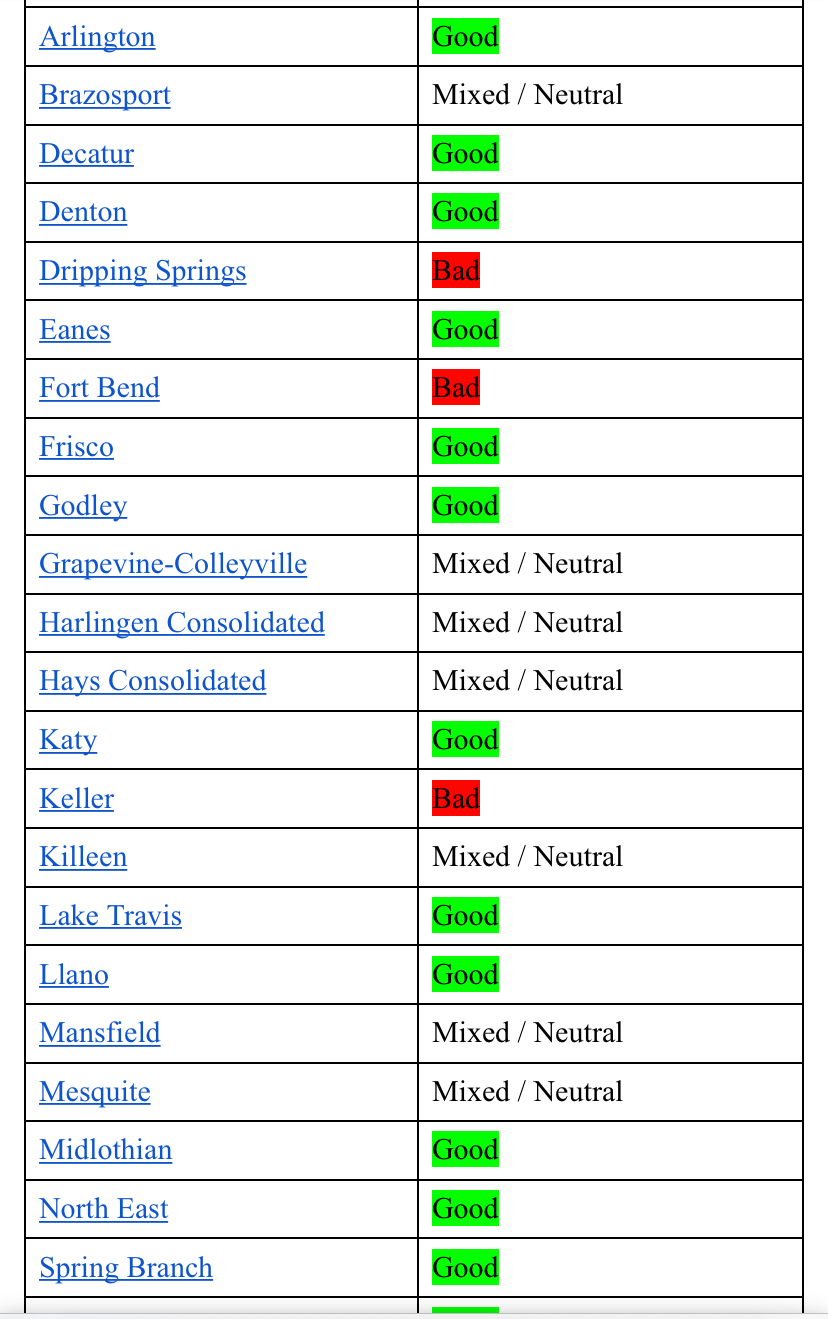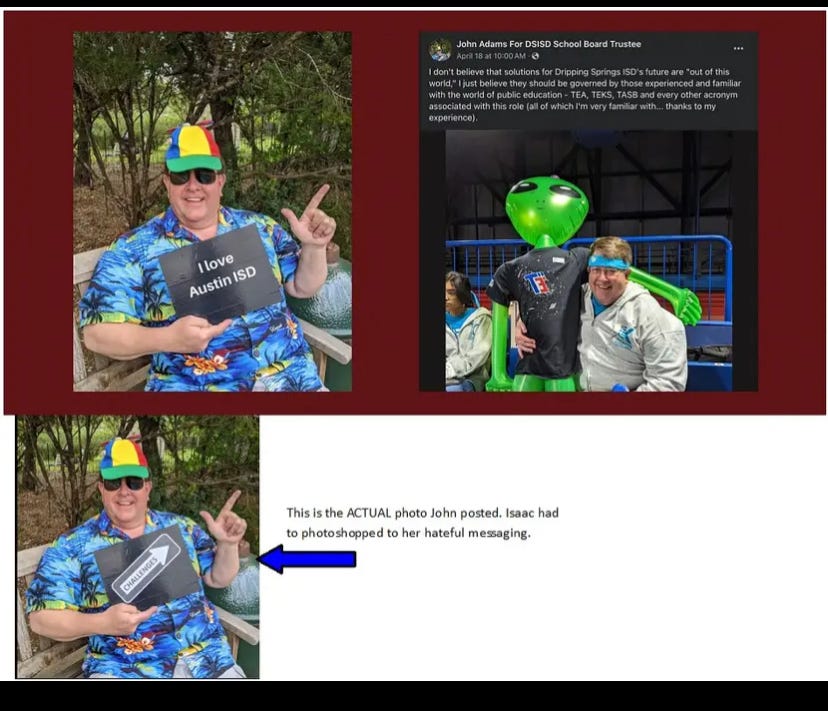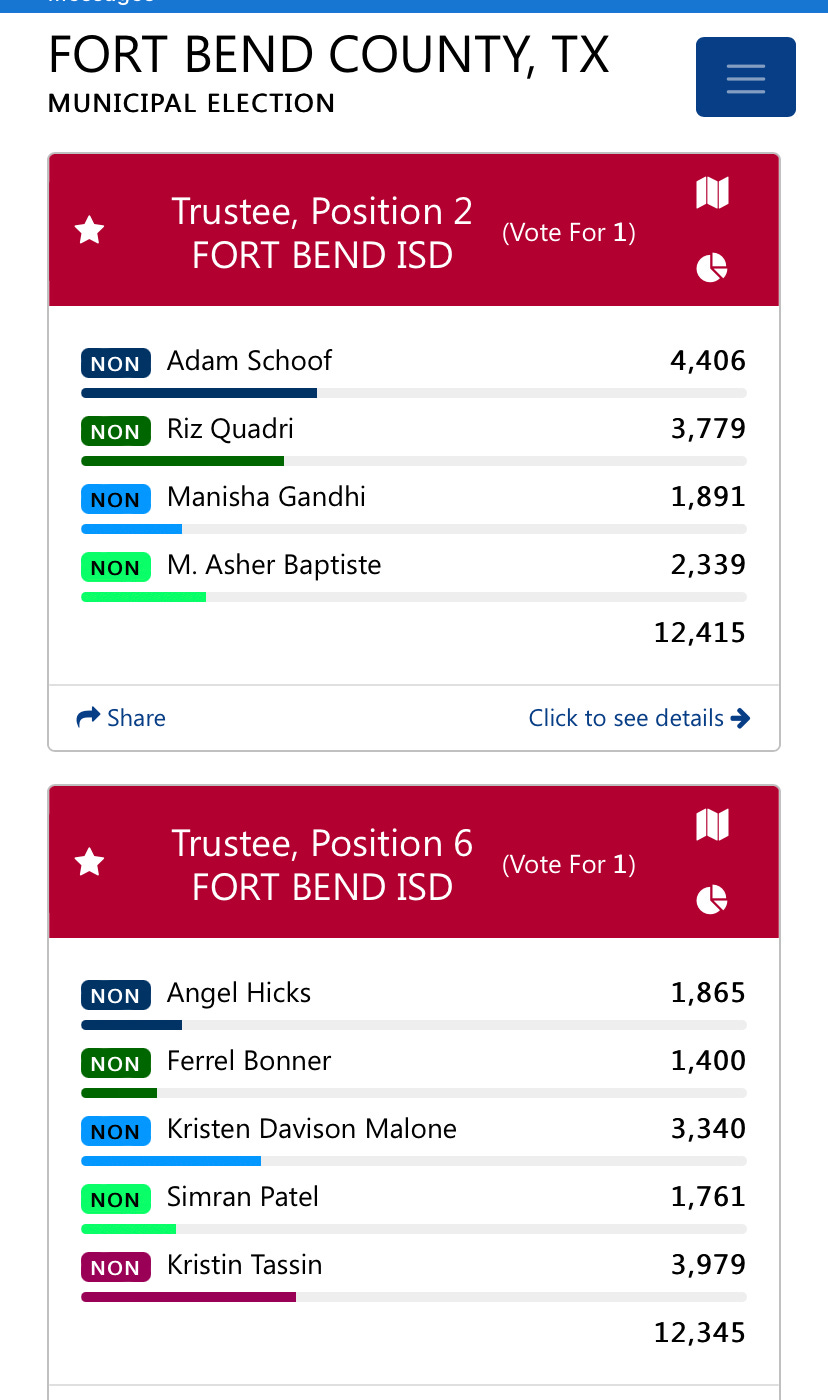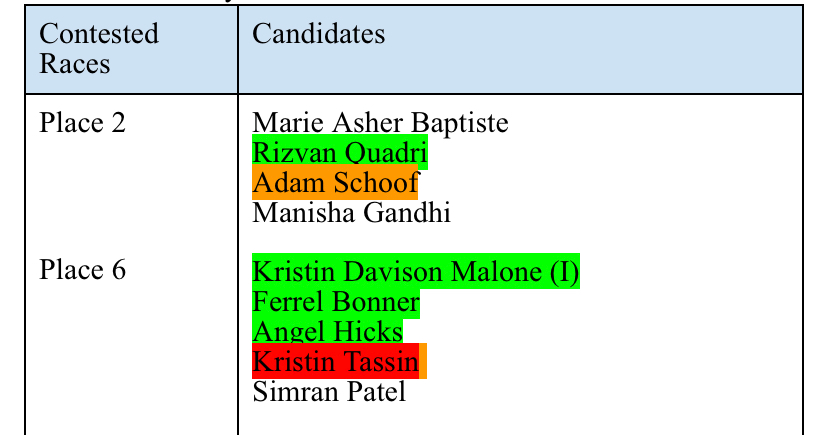What a Difference 2 Years Makes: Recapping the May 2024 Texas School Board Elections
Yesterday, many Texas school districts held elections for their boards of trustees. For months I’ve tracked contested races in 23 districts where there have been controversies about books, book bans, and censorship. My guide gave red or orange highlights to candidates who either were members of pro-censorship groups, had those groups’ support, or echoed the talking points of those groups. And I gave green highlights to candidates who stood up for the freedom to read and inclusive classrooms or who were attacked by pro-censorship groups.
The results last night were … great, overall!
Of the 41 candidates I gave red or orange highlights, only 8 won their races. Overall, the good guys won the day in 13 of the 23 districts I followed—and only 3 of 23 districts went the wrong way (7 had mixed or neutral results).
It wasn’t just the wins and losses, though; the margins also told a clear story. Red and orange highlighted candidates lost by huge percentages in many districts. Melody Fowler defeated Kendall Orr by 61 percentage points in Arlington ISD, for example, and Bridgette Marshall defeated Andy Rokovich by 65 in Victoria ISD. In contrast, the races in which red-highlighted candidates won were generally very close. The message across the state was unmistakable: banning books from districts is no longer a political winner in Texas, and attacking teachers and librarians will cost you a steep electoral price. That is a big change from the political mood in May of 2022.
Let’s get into some details.
Highlights:
Wow, North East ISD.
Before the election, I told anyone who would listen that North East ISD was the most consequential race in the state. Five open seats in a massive San Antonio district that has been a hotbed of Moms for Liberty activity and where the leader of the local M4L chapter lost her 2022 bid for the board by only 74 votes? And where, on top of that, extremists only had to win two seats to control a board majority? Yeah, I was nervous.
I didn’t need to be. Parents, teachers, and public school advocates in NEISD have been so organized, active, and laser-focused on preventing a board takeover that all five races were essentially over when early voting totals were announced. By the end of the night, all five pro-public-ed and anti-censorship candidates had won by an average margin of 30 percentage points. Phenomenal work, NEISD.
The PACs’ lock is broken.
Since 2022, wealthy PACs in Katy, Lake Travis, Spring Branch, and Keller have followed the Southlake model and essentially locked down all school board positions, dumping big money to support the candidates who have won every single race in those districts for two years.
This cycle, the candidates supported by those PACs expected to extend their majorities, and they seemed to have all of the tools in place to do so, including carefully recruited candidates, stacks of dollars, and support from national organizations like the 1776 Project PAC.
Only this time it didn’t work (Well, except in Keller—more on that in a bit). In Lake Travis, two trustees who have been thoughtful and forthright in defending books—Phillip Davis and Lauren White—won reelection by slim margins despite being targeted by the Lake Travis Families PAC. In Katy, KEEP Katy effectively organized to protect moderate incumbents Rebecca Fox and Dawn Champagne, thus preventing book-banning board president Victor Pérez from controlling a unanimous board and ensuring there will be at least some independent thought on questions involving LGBTQ issues and books. And maybe the night’s biggest surprise was in Spring Branch ISD, where the Spring Branch Families PAC-supported (and Moms for Liberty-endorsed) Matt Cone lost handily to moderate David Slattery.
I genuinely did not expect any of those wins, because the groups behind the book-banning candidates have been invincible since 2022. The results in these districts were incredibly heartening.
Really Bad Candidates Were Voted Down Across the State
Last night, voters rejected:
Melanie Barrios-Jones (Frisco ISD), Eduardo Gonzalez (Midlothian ISD), April Williams Moore (Arlington ISD), and Andy Rokovich (Victoria ISD) who all said that students should never have access to “age-relevant books with LGBTQ+ characters.” Barrios-Jones lost by 27 percentage points; Gonzalez, an incumbent, lost by 30; Williams Moore lost by 17; and Rokovich lost by 65.
Llano ISD candidate Pamela Huston, who called for the removal of more than 200 books in the district’s school libraries, saying, “I am against the filth in the books that are in our library.” She lost by 18 percentage points.
Debi Scaggs in Denton ISD, who has challenged more than 100 books in the district, and who recently enlisted the help of State House candidate Mitch Little to push for the removal of Jacob’s New Dress and Jacob’s Room to Choose at a dramatic board meeting. Scaggs lost her race by 26 percentage points.
Aaron Silva, who was behind the push for book challenges in Eanes ISD (his wife filed the majority of the challenges), and who has been using his platform to try to oust the district’s incumbents since 2022, lost. His race was one of last night’s closest—he lost by only 103 votes—but he also only gained 34% of the electorate. The race was only close because two better candidates (Catherine Walker and Kelly Marwill) split the other 66%. More on that below.
Lowlights:
Heartbreak in Keller and Dripping Springs
Three districts went the wrong way last night. I’m heartbroken for students and families in Keller ISD and Dripping Springs ISD. The races in both districts were close, but some great candidates were defeated in each.
And in both districts, high-ranking supporters of the book-banning factions engaged in some ugly, un-neighborly behavior as the election approached. In Dripping Springs, Texas State Representative Carrie Isaac created a website that attacked DSISD candidate Terri Purdy for the church she attends.
She also photoshopped a picture of candidate John Adams to look like he was holding a sign saying “I love Austin ISD.” (For the record, there’s nothing wrong with loving Austin ISD. I do!)
In Keller, someone drove around town in the dark of night putting signs that read “Warning: Austin Liberal” into the yards of people who had signs for candidate Dixie Davis.
Stop doing this.
I don’t know how many times I have to say this, but when good candidates split their votes, bad candidates get into office.
That almost happened in Eanes ISD, where Catherine Walker—a strong candidate—almost took enough votes away from Kelly Marwill to get Aaron Silva elected.
And it did happen in Fort Bend ISD.
Y’all. Fort Bend was a crucial race. As Texas Freedom to Read Project has documented, internet troll turned trustee David Hamilton has proposed a book removal policy for the district that, if enacted, would be one of the state’s worst. In April, his fellow trustees chose to wait until after the election to vote on the policy.
I said before the election that I was concerned about these races because “nothing worries me more than a high-stakes race with a glut of candidates.” Look at my ratings for the two FBISD races. What do you see?
That’s right. Several candidates who range from okay to good on the question of books in each race, but only one bad candidate in each race. What will happen every time in a race like that?
Yep. The bad candidates will win.
And sure enough, Aaron Schoof and Kristin Tassin will now sit on the FBISD board after winning 35% and 32% of the vote, respectively. It doesn’t mean FBISD libraries are doomed, but it does mean that parents and educators will have to work extra hard to persuade the new board of the dangers of Hamilton’s policy.
Guys. You have to coordinate.
Glass Half-Empty View
As I said, I’m pretty excited about the results from last night. But I do want to temper that with two doses of harsh reality. First, while my at-a-glance document has a lot of green and only a little bit of red, that only reflects last night’s results and doesn’t necessarily capture the balance of power in a given district. For example, it’s phenomenal that Phillip Davis and Lauren White were able to hold onto their seats in Lake Travis ISD, but they’ll still go back to a board where all five other trustees were supported by the Lake Travis Families PAC. Books are still going to get removed from that district, and Davis and White are mostly going to get outvoted on important issues. I can’t emphasize enough how far behind we started after the anti-CRT and anti-LGBTQ movements organized in 2021 and 2022.
Second, “moderate” in many Texas districts is still pretty damned censorious. As I detailed this week in the Texas Freedom to Read Project’s report on the EveryLibrary candidate survey, many trustees in Texas, even those that generally support libraries and librarians, are skeptical of the idea of a freedom to read or the value of student choice in reading materials. We have a lot of persuasion to do.
Glass Half-Full View
That said, these elections provide a strong foundation from which we can start restoring sanity to school boards next year. Because of the deep hole we found ourselves in after 2022, it will mean reshaping many boards—not just retaining incumbents, but actually picking off some of the trustees who swept into power on 2022’s wave of anti-book frenzy.
While that’s a hard task, this year’s election shows us that extremism on the issues of books and censorship is out of favor with the electorate. What’s more, the energy and organization on this issue are now on our side. And that’s great news.







